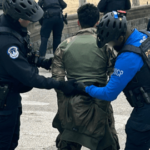
Ecuador’s president declared the beginning of an “internal armed conflict” in the country as violence by drug cartels sent the country into chaos.
The crisis began after a leading drug lord, Adolfo Macias, escaped an overcrowded prison on Sunday following an announcement from the government that high-profile convicts would be moved to maximum security prisons. Ecuadorian President Daniel Noboa declared a 60-day state of emergency the following day, empowering the police and military to restore order forcefully.

In response, drug cartels around the country launched a campaign of bombings, kidnappings, shootings, and prison uprisings. Another gang leader, Fabricio Colon Pico, escaped from prison on Tuesday.
The spectacle of violence reached new heights on Tuesday after gunmen armed with explosives and rifles stormed a television studio during a live broadcast in the city of Guayaquil, taking the crew hostage. After threatening to execute the hostages, the studio was stormed by police.
Videos posted on social media showed cartel gunmen wreaking havoc throughout the country. Students fled from the University of Guayaquil after it was stormed by gunmen allegedly looking for hostages. Other students barricaded themselves in their classrooms.
Other videos posted on social media showed cartel members murdering police hostages, one by hanging and another by gunfire.
The explosion in violence caused Noboa to declare an “internal armed conflict.” The declaration designated a slew of gangs as terrorist organizations and allowed the armed forces to carry out military operations to neutralize them.
Videos posted on social media showed armored personnel carriers and other military vehicles deploying troops around the country’s major cities.
U.S. Assistant Secretary of State for Western Hemisphere Affairs Brian Nichols expressed his support for the Ecuadorian government.
“Extremely concerned by today’s violence & kidnappings in Ecuador. The United States stands with the people of Ecuador. We are ready to provide assistance to the Ecuadorian government and will remain in close contact with President @DanielNoboaOk‘s team regarding our support,” he said in a post on X, formerly known as Twitter.
CLICK HERE FOR MORE FROM THE WASHINGTON EXAMINER
The conflict is the climax of rapidly growing violence that has brought the country to its knees over the past two years. Ecuador has been relatively peaceful by the region’s standards but saw a sudden spike in violence due to the drug trade. Last August, presidential candidate Fernando Villavicencio was assassinated at a campaign stop shortly after being threatened by one of the gangs designated a terrorist organization by Noboa on Tuesday.
The growth of gangs has been aided by the country’s prison system, which is effectively controlled by them. Some security experts estimate that up to one-fourth of Ecuador’s 36 prisons are controlled by gangs, the New York Times reported. Before his escape, Macias was believed to have operated his gang out of his prison cell.







